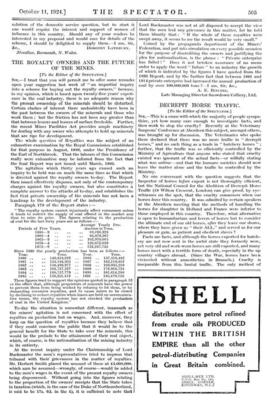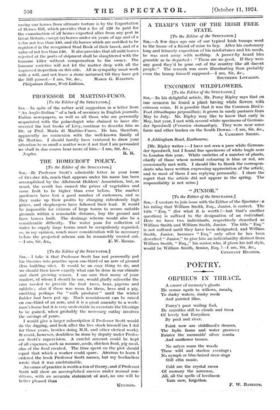DECREPIT HORSE TRAFFIC.
[To the Editor of the SPECTATOR.] SIR,—This is a cause with which the majority of people sympa- thize, yet how many care enough to investigate facts, and then work to stop the cruelty? Recently at the Veterinary Surgeons' Conference at Aberdeen this subject, amongst others, was brought up for discussion. The Veterinaries who spoke there declared that there was no more traffic in "decrepit horses," and no such thing as a trade in "butchery horses" ; further, that the traffic was so efficiently controlled by the
Ministry of Agriculture that anyone who stated thht cruelty existed was ignorant of the actual facts—or wilfully stating what was untrue—and that the humane societies should now leave the matter alone and the traffic be controlled by the Ministry.
No one conversant with the question suggests that the Inspector of horses before export is not thoroughly efficient, but the National Council for the Abolition of Decrepit Horse Traffic (19 Wilton Crescent, London) can give proof, by eye- witnesses on the spot, that the cruelty commences when our horses leave this country. It was admitted by certain speakers at the Aberdeen meeting that the methods of handling the horses for slaughter in Holland and France were inferior to those employed in this country. Therefore, what alternative is open to humanitarians and lovers of horses but to consider the ultimate end of our old horses, after they leave our shores, where they have given us "their ALL," and served us for our pleasure or gain, as patient and obedient slaves ?
Facts are facts, and although the horses exported for butch-
ery are not now sent in the awful state they formerly were, yet very old and work-worn horses are still exported, and many horses meet with a terrible form of death, especially in the up country villages abroad. (Since the War, horses have been vivisected without anaesthetics in Brussels.) Cruelty is inseparable from this brutal traffic. The only method of
saving our horses from ultimate torture is by the Exportation of Horses Bill, which provides that a fee of £20 be paid for the examination of all horses exported alive from any port in Great Britain, except (a) horses under six years of age and of a vEllue not less than £40, and (b) horses which are certified to be registered in the recognized Stud Book of their breed, and of a value of not less than 140. It also provides that all unfit horses rejected at the ports of shipment shall be slaughtered with the humane killer without compensation to the owner. The humane societies will not let the matter drop with all the improved inspection on this side. All in sympathy must work with a will, and not leave a stone unturned till they have got











































 Previous page
Previous page